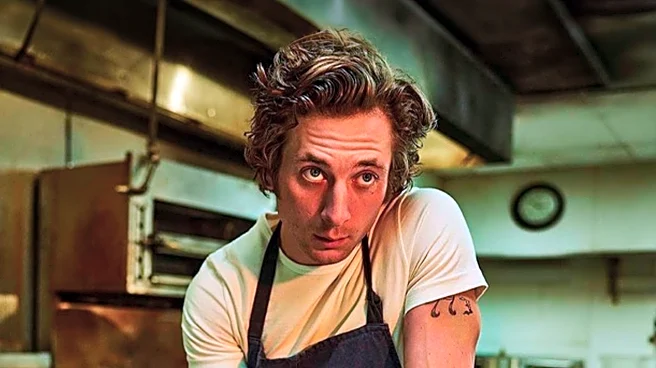What's Happening?
Jamie Oliver, a renowned chef, is facing criticism for cultural insensitivity in his new children's book, which allegedly portrays Indigenous Australians insensitively. This incident is part of a broader
trend where chefs and cookbook writers are scrutinized for cultural appropriation. Oliver has previously faced backlash for recipes like his paella and 'punchy jerk rice,' leading him to employ cultural appropriation specialists to vet his recipes. The controversy over recipes has intensified since the 2020 Black Lives Matter protests, highlighting frustrations among minority communities about the misrepresentation of their traditional dishes by white cookery writers. The debate extends to other chefs like Raymond Blanc, who views cultural appropriation as cultural enrichment, and Nigella Lawson, who has renamed some of her recipes to avoid offensive language.
Why It's Important?
The scrutiny over cultural sensitivity in cookery reflects broader societal shifts towards recognizing and respecting cultural heritage and identity. This trend impacts the culinary industry, where chefs must navigate the fine line between cultural appreciation and appropriation. The backlash against Oliver and others signifies a growing demand for authenticity and respect in culinary practices, which could lead to changes in how recipes are developed and presented. This movement also highlights the power of social media in amplifying voices from minority communities, pushing for equity and respect in cultural representation.
What's Next?
Chefs and cookbook authors may increasingly seek guidance from cultural experts to ensure their recipes are respectful and authentic. This could lead to a more inclusive culinary landscape, where diverse cultural influences are celebrated rather than appropriated. The industry might also see more collaborations with minority communities to create recipes that honor traditional practices. As the conversation around cultural sensitivity continues, chefs like Oliver may need to adapt their approaches to avoid further controversies and align with evolving societal values.
Beyond the Headlines
The debate over cultural sensitivity in cookery raises ethical questions about the responsibility of chefs to honor cultural heritage. It also reflects broader cultural shifts towards inclusivity and respect for diversity. This trend could influence other industries, encouraging a reevaluation of practices that may inadvertently perpetuate cultural stereotypes or insensitivity. The culinary world, as a microcosm of society, is at the forefront of these discussions, potentially leading to long-term changes in how cultural narratives are shaped and shared.










